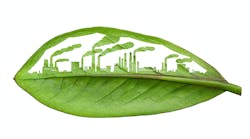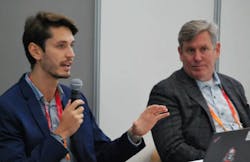Rockwell Automation’s Integrated Approach to Industrial Sustainability
“Making the move to an integrated sustainability approach—where sustainability initiatives are not treated as a stand-alone goal but as part of the manufacturing process—can be done by merging two megatrends: sustainability and digital transformation.” This statement by Andrea Ruotolo, global head of customer sustainability at Rockwell Automation, at Automation Fair’s ESG Summit highlighted Rockwell’s view about the interconnectedness of industry’s digital transformation and industrial sustainability.
In a further discussion at Automation Fair 2023 about the merging of digital transformation and sustainability initiatives, Rodrigo Alves, manager at Kalypso (a Rockwell Automation consulting business), noted that a recent survey by Rockwell Automation of more than 60 sustainability leaders at various industrial companies showed that 96% said digital transformation is important to the achievement of sustainability goals. Forty-three percent of those respondents categorized this connection as not just important, but vital to their success.
In response to these findings, Alves said Kalypso looks at the connection across five points: product development (designing for sustainability and a circular economy), manufacturing (AI- powered energy management, closed loop control, waste reduction and carbon capture and storage), distribution (supply chain traceability and emissions management), preventative maintenance (smart connected products to deliver maintenance insights) and end use along with scrap and re-use (waste traceability).
“We have to think of the whole product lifecycle and factor in the effects of the process from distribution to materials use,” said Alves. “That’s why we developed this set of services and offerings to enable digital transformation across each one of those pillars.”
He added that, as part of this approach, Kalypso will be bringing Rockwell Automation’s FactoryTalk Energy Manager to “leverage AI to deliver data-driven recommendations for remediation of energy losses on the shop floor.”
FactoryTalk Energy Manager was released at the end of October 2023. This industrial energy monitoring software features dashboards highlighting areas for improvement and optimization. It coordinates FactoryTalk InnovationSuite components, such as FactoryTalk Smart Objects and the ThingWorx platform. Rockwell Automation says the result is “a unique energy monitoring application that provides energy and production information based on an energy model of a plant’s underlying process.” In addition to the use of Factory Talk Energy Manager, Kalypso’s overall energy management approach includes energy consulting; design and implementation of building/utility management systems and process optimization; energy distribution through load shedding, demand management, cogeneration and renewables integration; and energy optimization through the use of AI, model predictive control and closed-loop algorithms.
Applying this strategy, Alves said it enables industrial users to “understand if a machine is consuming a certain amount of power compared to its throughput so that a baseline can be developed with which companies can save energy and positively influence production scheduling.”
Differences among industries
Based on Kalypso’s work with an array of industrial companies on their various sustainability goals—whether they’re driven by overall market interests and demands or specific regulations—Alves noted that there isn’t one industry segment he would consider as being ahead of others when it comes to sustainability.
“I think every industry has different challenges. For consumer-packaged goods companies, their focus on Scope 3 emissions tends to be higher than other industries [Scope 3 relates to effects a business is indirectly responsible for, such as materials from suppliers and customers’ use of their products.]. More energy-intensive industry segments will, of course, focus more on energy management in their manufacturing operations. So it's a matter of priorities. There are lessons to learn from each industry.”
In his presentation, Alves highlighted Kalypso’s sustainability work across five industry sectors:
- Enabling a construction equipment manufacturer to achieve energy related goals and reduce emissions using a Kalypso-generated roadmap that identified and prioritized sustainability initiatives for the company.
- Helping an energy supplier predictively monitor emissions using continuous emissions monitoring software with machine learning to granularly calculate NOx emissions. This enabled the energy company to comply with environmental reporting requirements and achieve cost savings without the implementation of hardware analyzers.


